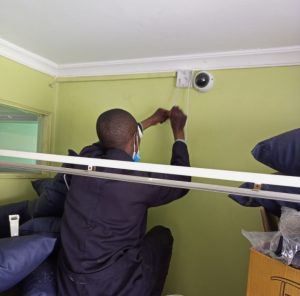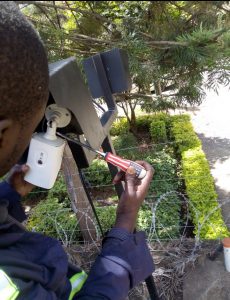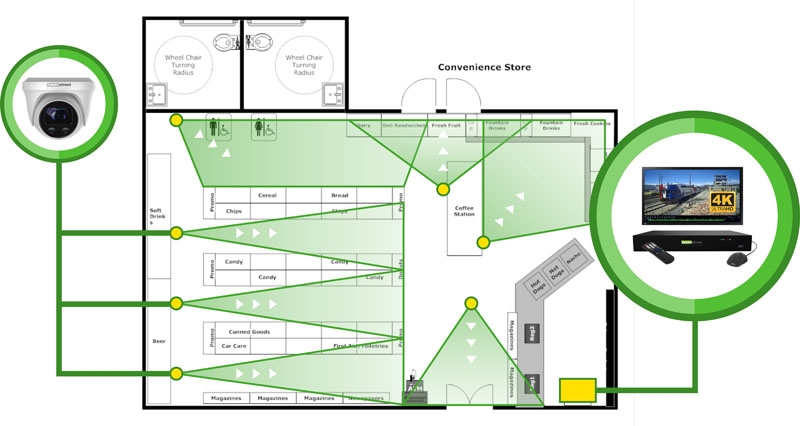
CCTV INSTALLATION SERVICES IN KENYA.
Our CCTV security systems technicians carefully select, place and integrate every security system component to ensure smooth operation and compatibility.
We have years of experience in planning, customization and installation of comprehensive CCTV systems. We offer, infrared cctv cameras, full colored cctv cameras, IP video surveillance systems, indoor and outdoor camera systems and cutting-edge video analytics. We specialize in designing and installing business security camera systems. Our security professionals understand our clients’ needs and take the time to assess your property and learn about your business to address your CCTV installation needs. We design and install a business security camera solution that meets those objectives, and we tweak the system design as your business grows and security needs change.
Free System Design Quote
- – Expert System Design: – Best Camera Locations: – Expected Fields of View: – Video Transmission Design.


CCTV FAQ, frequently asked questions.
CCTV Cameras Frequently Asked Questions! What is the duration of recording? Period of recording is decided by a number of factors that are image resolutions, FPS, Hard disk space and recording setting. As an example,4 cameras on a 2TB HDD are going to be able to record up to 3-5weeks if the system is about to record on motion recording at 12 FPS and 1080P resolution.
What is the camera’s area of coverage? The realm of coverage depends on the Lens size that you simply opt for. As an example, a 2.8mm lens are going to be able to provides a wide coverage of a hundred and twenty degree where as a 12mm lens can provides a slender angle of twenty five degree.
What is the average lifespan of CCTV Cameras? CCTV Cameras typically have a period of 3-5 years. However, it is recommended that the customer upgrade their CCTV cameras after a period of 3 years.
Can the camera operate in low light environment? Yes, all our cameras area unit fitted with twilight vision capabilities. Once the camera senses that the realm is dark, twilight vision mode are going to be activated, serving to users to be able to read the realm even in complete darkness.
For an IP camera surveillance system, what kind of network connection do I need? For your network, you can utilize a hardware router (wired) or a WiFi connection (wireless). Wired networks are more secure and stable, and while WiFi is more convenient, it increases the requirement for security. We usually assist you in encrypting these networks and customizing a wireless network to reduce the likelihood of any WiFi setup issues. You can also utilize a cellular network, which is generally safer than WiFi but slower. Boardtac can go over your alternatives with you and help you decide which one is appropriate for your unique setup and security requirements. Contact us today for professional CCTV Camera installation services.
What is the difference between IP and Analog CCTV Cameras? Analogue cameras records video on a digital video recorder (DVR) and are cheap. They do not, however, provide the same level of versatility, high resolution, or security as IP cameras.
What are the components I’ll require for IP or Network CCTV Cameras? An IP surveillance system requires IP cameras, an NVR and peripherals such as microphones and speakers, which are usually embedded into the cameras and do not require additional parts. We can help you identify your demands and match you with the best equipment for your budget. Contact us for the best CCTV Camera service in Kenya.
What benefits do IP surveillance systems offer? Traditional CCTV systems do not offer many advantages that IP surveillance solutions do. They provide: Higher resolution, Easy installation, Improved capabilities for the cost, Faster and more dependable, Easy management, and Easy compliance with IT regulations, among other benefits.
What happens if the electricity goes out? Security As soon as the power is restored, the DVRs and NVRs will turn back on. However, we recommend using an uninterruptible power supply (UPS), which can offer short-term backup power while also acting as a surge protector. This assures that your video surveillance will remain operational even if the power is off, allowing a break-in to go unreported.
How much CCTV storage do I need? It is suggested that commercial security camera footage be kept for at least 30 days in most cases. Camera footage is frequently held for up to 90 days in major operations, necessitating a larger storage system with more capacity. Using more physical space and hard drives, as well as more terabytes of space, means storing more footage. To keep 1080p footage for 30 days at industry standard frames per second, the average 12-camera corporate security system requires at least 8 terabytes of space.
Do security cameras require a Hard Drive? Hard drives and/or cloud-based storage are required for recording security camera footage.
Is it necessary for outside cameras to be weatherproof? If you’re installing an outdoor security camera system, be sure all of the cameras are waterproof and weatherproof, and that they can survive wetness, heat, and cold. Commercial outdoor security cameras are a fantastic choice for any security system.
Can you use an outdoor security camera indoors? Indoor security cameras are more durable than outside security cameras. Large bullet cameras, for example, are simply too cumbersome to be put properly indoors. The majority of indoor security cameras, on the other hand, are neither weatherproof or durable enough to endure the rain.
Do security cameras work in low-light conditions? Not all security cameras work in the dark. A shutter on security cameras with low-light capabilities permits more light to enter the camera’s sensor. The brighter the image, the more light that is let into the camera. Even these low-light cameras, however, have digital noise, which makes the dark image look fuzzier. Some security cameras use 2D and 3D digital noise reduction to help with the fuzziness. Some security cameras now include infrared light, which is undetectable to the naked eye but detectable by the camera’s sensor.
